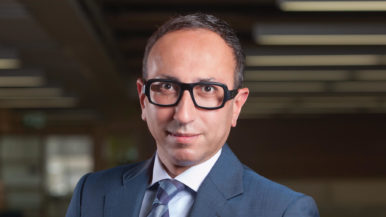I had to decide whether to take my academic career to Canada. Donald Trump made it an easy choice

Jerry Flores, 32
Education: PhD in sociology from UC Santa Barbara
Moved from: Tacoma, Washington
Moved to: Mississauga
I grew up in a Mexican neighbourhood in Pasadena, where almost everyone was a new immigrant—including my parents, who had arrived there after the Mexican economy collapsed in 1982. As I grew up, I started to feel increasingly disconnected from the American educational system. At 16, I dropped out of high school and transferred to an alternative school on the outskirts of Los Angeles County. It was kind of the last stop in California public education. But the classes were small, which meant more individual attention from teachers—and so I was actually able to do well there. I was even able to go back to my old high school and graduate. Then I went to community college. After that, I did a master’s degree. Eventually, I earned my PhD.
And that’s how a one-time high-school dropout got a job in academia. In 2014, I took a position as an assistant professor in the University of Washington Tacoma’s social work and criminal justice program, where my research focused on young women in the U.S. criminal justice system. There were only about 30 people of colour on the faculty; I was one of five Latinos. I would hear things at faculty meetings that seemed like thinly veiled racism to me. (Once, during a graduate seminar, I was I asked if I “actually work here.”) And I was always saddled with unpaid diversity-related service—people would be asking me to serve on all these committees. Where I lived, in Tacoma, I was often the only person of colour wherever I went.
I was constantly looking for other jobs. In November, I landed three: one at Rutgers, one at the University of California Riverside and one at the University of Toronto. I had to decide which offer to accept.
On election night, I had these three contracts in front of me. My wife, Angie, was watching the news with me, and then we realized that Wisconsin was going red. I knew it was over for Hillary Clinton, and I knew exactly what would happen when Donald Trump got elected. Racists are lazy; they don’t reinvent the wheel. It’s always the same dynamic. I was dreading the day when I was going to have to talk to my sons about how to deescalate situations with the police. I know that stuff happens in Canada, but it’s not as bad.
I turned to Angie, and I said, “Babe, are we moving to Canada?” And she said, “Yeah, I think so.” I signed my U of T contract that night.
I’m now an assistant professor in the sociology department at U of T. We’re renting a house near Square One, in Mississauga, but we’ll probably end up buying a home in Etobicoke. Living in the U.S., I felt like a second-class citizen for most of my life, but I feel like I can be a man in Toronto. I blend in. I’m not the only person who looks like me all the time.
The move was hard on Angie, because she has always loved the northwest. But we agree that living in Canada is what’s best for our family. Sol, the oldest of my three sons, is four years old. He still occasionally asks about his old house, and his friends in Tacoma, but he seems to be acclimating. The other day I picked him up from school. He’d been learning “O Canada.” I asked him, “Babe, are you Canadian?”
He said, “Yeah, papa. I’m Canadian.”
Did you move to Canada recently to get away from the U.S.? We want to talk to you.






